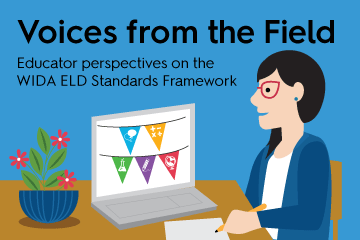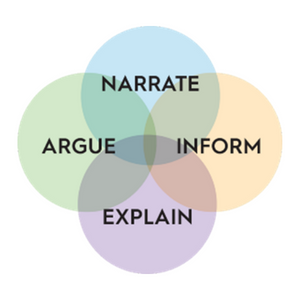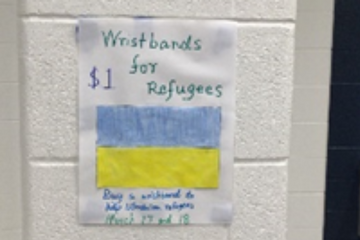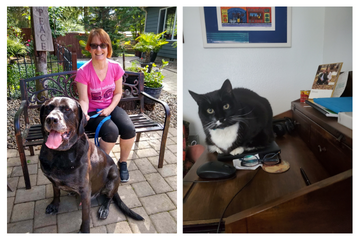WIDA Voices from the Field: Project-Based Learning and Wristbands for Refugees

Multilingual learners in kindergarten through fifth grade at Madison School in Hinsdale, Illinois, enthusiastically participated in project-based learning (PBL). Their project was called Wristbands for Refugees. Multilingual learners at various English proficiency levels (from early to advanced) were all active participants who collaborated and made the project a success.
Project-based learning is great for multilingual learners because it allows students to simultaneously develop their English skills while making a positive difference in the world. It also allows for the authentic use of language as students develop important academic practices and skills.Wristbands for Refugees was connected to state academic content standards in language arts and social science, and centered on developing questions, planning inquiries, communicating conclusions, and taking informed action. 
In Wristbands for Refugees, multilingual learners organized and administered a fundraising project to raise money for the International Rescue Committee to help Ukrainian refugees. This project raised the stature of multilingual learners in our school and elevated how cool it is to be a multilingual learner!
It was easy to use the WIDA English Language Development Standards Framework to shine a light and support language development for my lesson plans for this project. The Key Language Uses (KLUs) helped give direction and focus for language objectives. Here are some ways students used KLUs throughout the project:
Students were able to use the KLU Narrate…
… after listening to the book Where Will I Live? and discussing its main idea and comparing their lives to children in the book.
 Students were able to use the KLU Explain…
Students were able to use the KLU Explain…
...in their project in journal writing or a language experience activity.
… to convey to students in their group why Ukrainian refugees need help. They realized it was not possible to send food or clothes, so we discussed raising money to donate to an organization that helps refugees. We decided to sell wristbands with messages of kindness that the students selected from choices.
Students were able to use the KLU Argue…
… when they decided on a price for the wristbands. They were able to state reasons why they thought a price was good and evaluate the arguments for and against different prices. (e.g., "Nobody will buy a wristband for $1,000!" "We need to ask for money to pay for the wristbands and get enough to donate." "I would pay a dollar for a bracelet.")
... when they decided how to account for the money they raised. The students who were the bankers had to develop an organized way to count the money. They had to introduce and justify their best ideas for counting all the money. There was a lot of money to count! (e.g., Should one person count each grade level individually, or should the money be put together? Should they sort the bills and coins before counting them?). Students had to respond to other students' ideas, telling the group why the idea would work or adding their own ideas.
Students were able to use the KLU Inform when they…
… composed and read a PA announcement to tell the school about their wristband sale and the reason for it prior to the sale.
… made posters and created a take-home flyer for parents, stating the main idea of their sale while giving important details.
… made a video for classrooms about Wristbands for Refugees. They had the job of introducing the topic of refugees and explaining the needs of refugees, while providing details about their project.
Hopefully, Wristbands for Refugees will encourage elementary teachers to do PBL projects with their multilingual learners. I hope it also encourages administrators to support this type of learning in their schools. It's important to remember that school is not just about doing worksheets and taking tests - school is about being a good person and a good global citizen. The following quote demonstrates the importance of authentic language learning with multilingual learners: "Language is learned, not because we want to talk or read or write about language, but because we want to talk and read and write about the world." – Courtney Cazden

About the author
 Donna DeVito teaches multilingual learners (MLs) at Madison School (Hinsdale, IL) in Community Consolidated School District 181. She is a National Board Certified teacher in English as a new language. As the daughter of first and second generation immigrants, she has always had a passion for helping MLs succeed in school and life. In fact, she taught her first ML student when she was six years old growing up in the Heart of Italy/Pilsen neighborhood of Chicago. She taught English classes to an Italian boy who lived in her family's two flat using a Golden Book Encyclopedia. (No, WIDA did not exist back then!) Donna also enjoys teaching English classes to parents in her school district. When she is not teaching, she enjoys traveling and studying Spanish in countries such as Guatemala, Costa Rica and Ecuador.
Donna DeVito teaches multilingual learners (MLs) at Madison School (Hinsdale, IL) in Community Consolidated School District 181. She is a National Board Certified teacher in English as a new language. As the daughter of first and second generation immigrants, she has always had a passion for helping MLs succeed in school and life. In fact, she taught her first ML student when she was six years old growing up in the Heart of Italy/Pilsen neighborhood of Chicago. She taught English classes to an Italian boy who lived in her family's two flat using a Golden Book Encyclopedia. (No, WIDA did not exist back then!) Donna also enjoys teaching English classes to parents in her school district. When she is not teaching, she enjoys traveling and studying Spanish in countries such as Guatemala, Costa Rica and Ecuador.
About the series: Voices from the Field
Fernanda Marinho Kray, WIDA ELD Standards Framework program lead, and Melissa Paton, professional learning guru extraordinaire, have been hearing from a variety of educators about how they are making sense of the 2020 Edition. In response, the program established this “Voices from the Field" series to present ideas, practices and tools for educators as they explore various avenues for standards implementation.
BTS (Behind the Scenes)

When they’re not busy talking with educators and learning about great things happening in classrooms, Fernanda and Melissa have to answer to some pretty demanding (and, um, hairy) bosses.
Fernanda’s dog, Biscuit, loves to follow Mama Figsy from room to room, so he’s a constant work companion. When Biscuit first arrived one year ago he was very, very shy, and he’s just now learning to find his voice. Go little Biscuit, go! Finding our voices is such an important part of growing up. We’re looking forward to seeing your happy little tail wagging always, and your little self glowing through your new-found bark.

Melissa’s dog, Moses the Mastador, joined the WIDA family in May of 2020 at the age of eight. From day one he’s taken his role as Melissa’s supervisor very seriously, ensuring that he is no more than two feet from her, 24/7. (There may be some crying when he can’t find her.) In his free time, Moses enjoys walking with assistant supervisor, Pablo Cat, and watching the sunset from his favorite lifeguard tower in Malibu. Moses is a masterful singer. He performs regularly during Zoom meetings and webinars.
To stay informed about WIDA ELD Standards Framework resources, tools and services and receive WIDA’s quarterly Standards Newsletter, The Big Idea, use the news sign up form to manage email preferences and select WIDA ELD Standards as an interest area.





